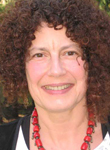German studies professor looks to the future
By Linda B. Glaser

Although Leslie Adelson specializes in German literature from 1945 to the present, these days her sights are set firmly on the future.
With nuclear danger, global warming and “the distant but scientifically predictable extinction of planet Earth,” the future is pressing, Adelson said during a recent talk sponsored by the Institute for Comparative Modernities, “Horizons of Hope in Times of Despair: Alexander Kluge’s Cosmic and Global Miniatures for the 21st Century, A Literary Perspective.”
Adelson’s latest work explores how human relationships to the future are already changing in the 21st century, as expressed in German literature written since the Cold War. Adelson said she hoped “to spark reflection across the disciplines about the changing status, stakes and forms of futurity that are most pressing in the world today.”
As director of the Institute for German Cultural Studies, Adelson notes that 1989 – at least in the interdisciplinary field of German studies – has been “a chronological and symbolic touchstone by which some measure the difference between the past and the present, between a century of hot and cold wars and a global century of hopes, fears and futures still unfolding.”
But futurity, Adelson asserts, is not a fixed concept. Rather, the future is a temporal dimension “necessarily entwined in varying relationships to past and present.” Futurity is a “protean abstraction” that allows us to account for widely varying “uses” of the future that shape our interconnected lives today.
Adelson probes what she calls “quirky relations between pastness and futurity – in dimensions both large and small” in the literary output of Alexander Kluge, specifically his so-called new stories, that Adelson has labeled “cosmic miniatures,” her term for short literary experiments that probe human relations to the cosmos.
Philosophers have long distinguished between the objective time of the universe and the subjective time of human experience, Adelson contends, and Kluge’s experimental approach to this scalar relationship becomes important because the horizon of the future becomes accessible to human experience for readers of Kluge’s quirky prose. This challenges one of the core precepts of European modernity, namely, the image of the future as fundamentally open and – by definition – inaccessible to experience.
Kluge, born in Germany in 1932, is in Adelson’s assessment one of the most dynamic public intellectuals in Europe today, having received most of Germany’s major prizes in film, literature and philosophy. By creating narrative forms that activate a kind of “future-making,” Kluge’s cosmic miniatures also make us see scalar networks of 21st-century globalization in new ways, Adelson says.
Adelson also is working on related projects examining the literary imagination as a form of labor. Her other interests include German literature of the postwar and post-socialist eras, emergent literatures associated with minority and migrant populations (including Jews and Turks), and postcolonial theories of difference and contact.
Her books include “The Turkish Turn in Contemporary German Literature: Toward a New Critical Grammar of Migration,” “Making Bodies, Making History: Feminism and German Identity” and “Crisis of Subjectivity: Botho Strauss’s Challenge to West German Prose of the 1970s.” With Devin Fore of Princeton University, she is co-editing a special issue of The Germanic Review that will be devoted to “Futurity Now,” coming out in August.
Linda B. Glaser is staff writer for the College of Arts and Sciences.
Media Contact
Get Cornell news delivered right to your inbox.
Subscribe